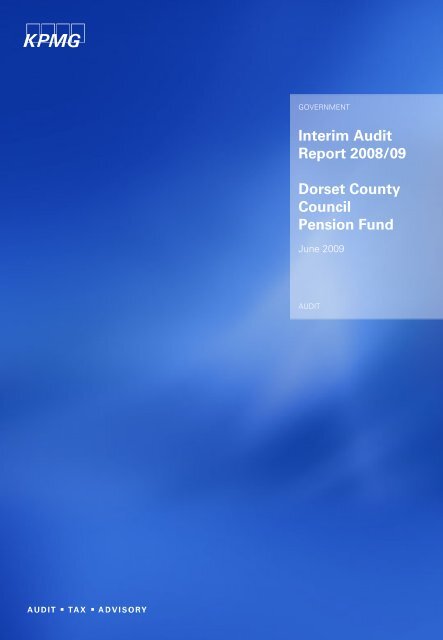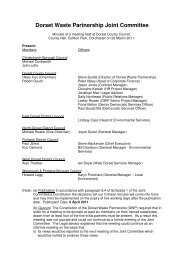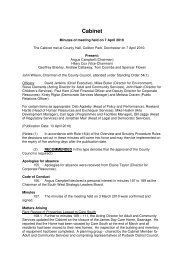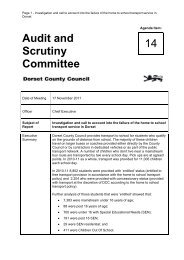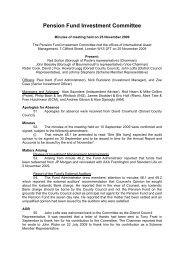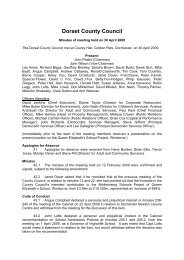KPMG Report Portrait Template 1 - Dorsetforyou.com
KPMG Report Portrait Template 1 - Dorsetforyou.com
KPMG Report Portrait Template 1 - Dorsetforyou.com
Create successful ePaper yourself
Turn your PDF publications into a flip-book with our unique Google optimized e-Paper software.
GOVERNMENT<br />
Interim Audit<br />
<strong>Report</strong> 2008/09<br />
Dorset County<br />
Council<br />
Pension Fund<br />
June 2009<br />
AUDIT
Content<br />
The contacts at <strong>KPMG</strong><br />
in connection with this<br />
report are:<br />
June Awty<br />
Partner<br />
<strong>KPMG</strong> LLP (UK)<br />
Tel: 02073 111769<br />
June.awty@kpmg.co.uk<br />
Gemma Broom<br />
Manager<br />
<strong>KPMG</strong> LLP (UK)<br />
Tel: 0117 9054382<br />
Gemma.broom@kpmg.co.uk<br />
Page<br />
Executive summary 2<br />
Financial statements 3<br />
Appendices 5<br />
A. Re<strong>com</strong>mendations<br />
B. Accounts risks<br />
C. Review of internal audit<br />
This report is addressed to the Council and has been prepared for the sole use of the Council. We<br />
take no responsibility to any member of staff acting in their individual capacities, or to third parties.<br />
The Audit Commission has issued a document entitled Statement of Responsibilities of Auditors<br />
and Audited Bodies. This summarises where the responsibilities of auditors begin and end and<br />
what is expected from the audited body. We draw your attention to this document.<br />
External auditors do not act as a substitute for the audited body’s own responsibility for putting in<br />
place proper arrangements to ensure that public business is conducted in accordance with the law<br />
and proper standards, and that public money is safeguarded and properly accounted for, and used<br />
economically, efficiently and effectively.<br />
If you have any concerns or are dissatisfied with any part of <strong>KPMG</strong>’s work, in the first instance you<br />
should contact June Awty, who is the engagement partner to the Council, telephone 02703111769,<br />
email june.awty@kpmg.co.uk who will try to resolve your <strong>com</strong>plaint. If you are dissatisfied with your<br />
response please contact Trevor Rees on 0161 236 4000, email trevor.rees@kpmg.co.uk, who is the<br />
national contact partner for all of <strong>KPMG</strong>’s work with the Audit Commission After this, if you are still<br />
dissatisfied with how your <strong>com</strong>plaint has been handled you can access the Audit Commission’s<br />
<strong>com</strong>plaints procedure. Put your <strong>com</strong>plaint in writing to the Complaints Investigation Officer,<br />
Westward House, Lime Kiln Close, Stoke Gifford, Bristol, BS34 8SR or by e mail to:<br />
<strong>com</strong>plaints@audit-<strong>com</strong>mission.gov.uk. Their telephone number is 0844 798 3131, textphone<br />
(mini<strong>com</strong>) 020 7630 0421<br />
© 2009 <strong>KPMG</strong> LLP, a UK limited liability partnership, is a subsidiary of <strong>KPMG</strong> Europe LLP and a member firm of the <strong>KPMG</strong> network of independent member<br />
firms affiliated with <strong>KPMG</strong> International, a Swiss cooperative. All rights reserved. This document is confidential and its circulation and use are restricted.<br />
<strong>KPMG</strong> and the <strong>KPMG</strong> logo are registered trademarks of <strong>KPMG</strong> International, a Swiss cooperative.<br />
1
Section one<br />
Executive summary<br />
Scope of this report<br />
This report summarises our planning and interim audit work for the Dorset County Council Pension Scheme (‘the<br />
Scheme’) in relation to the 2008/09 financial statements. A significant proportion of our accounts audit is<br />
<strong>com</strong>pleted before we receive your financial statements. In particular, our work to date covers the following areas:<br />
• Audit planning and risk analysis: We have identified the key issues for the 2008/09 financial statements and<br />
discussed your progress in addressing these.<br />
• Control evaluation: We have reviewed your progress with the closedown and accounts production process. We<br />
have also tested controls over the key financial systems. We rely on the work of internal audit at the Council<br />
wherever possible, and <strong>com</strong>plete an assessment of the internal audit function as part of this work.<br />
Section 2 provides further details of the work <strong>com</strong>pleted and sets out our findings.<br />
Our re<strong>com</strong>mendations are included in Appendix A.<br />
Summary of findings<br />
• We have reviewed the Scheme’s plans for closedown and accounts preparation. The process in place should<br />
support the timely production of materially accurate financial statements.<br />
• We have identified four key accounting areas for the 2008/09 financial statements. These are summarised in<br />
more detail in Appendix B. These issues are being taken seriously by the Council and progress has been made<br />
to date in addressing each of the risks identified.<br />
• We assessed your high level financial control framework as good overall. Our audit identified one significant<br />
issues in relation to the organisational control environment which is detailed in Appendix A.<br />
• We were able to rely on the relevant work undertaken by the internal audit team in respect of the Pension Fund<br />
in the year for the key financial systems.<br />
• There is no clear segregation of funds or documented investment responsibilities between the Council and the<br />
Pension Fund. As a result it is unclear which organisation is liable for the Fund’s potential loss of monies<br />
following the banking collapse in Iceland.<br />
Acknowledgements<br />
We would like to take this opportunity to thank officers and members for their continuing help and co-operation<br />
throughout our audit work.<br />
© 2009 <strong>KPMG</strong> LLP, a UK limited liability partnership, is a subsidiary of <strong>KPMG</strong> Europe LLP and a member firm of the <strong>KPMG</strong> network of independent member<br />
firms affiliated with <strong>KPMG</strong> International, a Swiss cooperative. All rights reserved. This document is confidential and its circulation and use are restricted.<br />
<strong>KPMG</strong> and the <strong>KPMG</strong> logo are registered trademarks of <strong>KPMG</strong> International, a Swiss cooperative.<br />
2
Section two<br />
Financial statements<br />
Introduction<br />
Our work in respect of the audit of financial statements is split into the stages shown below:<br />
Stage Tasks Timing<br />
Completed<br />
Planning<br />
• Updating our business understanding and risk<br />
assessment<br />
• Assessing the organisational control environment<br />
• Issuing our accounts audit protocol<br />
December 2008 to<br />
February 2009<br />
<br />
• Reviewing the accounts production process<br />
Control<br />
Evaluation<br />
• Evaluating and testing controls over key financial systems<br />
• Review of internal audit<br />
• Evaluating and testing controls over authority<br />
management and control<br />
March to<br />
April 2009<br />
<br />
Substantive<br />
Testing<br />
• Planning and performing substantive work<br />
• Concluding on critical accounting matters<br />
June to July 2009<br />
-<br />
Completion<br />
• Completion procedures<br />
• Forming our audit opinion<br />
August to<br />
September 2009<br />
-<br />
Key issues in respect of each of these tasks is summarised below.<br />
Planning - Risk assessment<br />
Our 2008/09 Audit and Inspection Plan included our initial assessment of the risks impacting on the 2008/09<br />
financial statements. We have updated this during the course of our interim audit and include a detailed outline of<br />
the key accounting issues and risks for the Pension Fund accounts for 2008/09 in Appendix B.<br />
We have discussed these risks with the finance team as part of our planning and update meetings. It is noted that<br />
these issues are being taken seriously by the Scheme and progress has been made to date in addressing each of<br />
the risks identified as outlined in Appendix B. However, these still present significant challenges that require<br />
careful management and focus. We will revisit these areas during our final accounts audit.<br />
Planning - Organisational control environment<br />
The organisational controls we assess are based on your high level system of internal control which includes how<br />
the Fund is governed.<br />
As noted on page 2, arrangements in respect of investment responsibilities and treasury management between<br />
the Council and the Pension Fund would benefit from further consideration with a view to clarifying and<br />
documenting roles and responsibilities.<br />
Re<strong>com</strong>mendations are included in Appendix A.<br />
© 2009 <strong>KPMG</strong> LLP, a UK limited liability partnership, is a subsidiary of <strong>KPMG</strong> Europe LLP and a member firm of the <strong>KPMG</strong> network of independent member<br />
firms affiliated with <strong>KPMG</strong> International, a Swiss cooperative. All rights reserved. This document is confidential and its circulation and use are restricted.<br />
<strong>KPMG</strong> and the <strong>KPMG</strong> logo are registered trademarks of <strong>KPMG</strong> International, a Swiss cooperative.<br />
3
Section two<br />
Financial statements (continued)<br />
Planning - Accounts audit protocol<br />
This important document explains our audit process with details of our audit team, audit approach and timetable. It<br />
also summarises the working papers and other evidence we require you to provide as part of the preparation of the<br />
financial statements. We issued this to the finance team in April 2009. We have tailored the document to reflect<br />
our requirements in respect of the specific accounting issues identified above.<br />
Control Evaluation - Accounts production process<br />
We have reviewed your plans for preparing for your closedown and accounts preparation. You have incorporated a<br />
number of measures into your closedown plan to further improve the project management of this process.<br />
We consider that your planned processes for the preparation of your financial statements are adequate and should<br />
support the timely production of materially accurate financial statements.<br />
Control Evaluation - Controls over key financial systems<br />
We work with internal audit to:<br />
• update our understanding of key financial systems;<br />
• confirm our understanding of these systems by <strong>com</strong>pleting walkthrough testing; and<br />
• document, evaluate and test the control framework for these systems.<br />
We have relied on the work <strong>com</strong>pleted by internal audit for 2008/09 over the Pension Fund’s key systems and<br />
controls. For each of the key financial systems internal audit tested high level controls, which are strong controls<br />
that should address the key risks. Examples are reconciliations or exception reports.<br />
We assessed your high level financial control framework as good overall.<br />
Internal audit gave a substantial assurance opinion in respect of the systems and internal controls operating within<br />
the area audited and included re<strong>com</strong>mendations in their reports as appropriate in respect of contributions and<br />
refunds.<br />
The weaknesses identified by internal audit over contributions and refunds have not resulted in additional external<br />
audit testing as the high level controls were in place.<br />
Control Evaluation - Review of internal audit<br />
The Accounts and Audit Regulations 2003 require public bodies to maintain an adequate and effective system of<br />
internal audit of their accounting records and of their system of internal control. For principal local authorities,<br />
guidance is contained in the Code of Practice for Internal Audit in Local Government (‘the Code’). The Code<br />
defines the way in which internal audit should be established and operated and applies equally to in-house audit<br />
teams and those provided by external contractors.<br />
We did not identify any significant issues with their work and are pleased to report that we have been able to place<br />
full reliance on internal audit’s work on the key financial systems. We particularly noted improvements in terms of<br />
the quality of system documentation and the adequacy of sample sizes used by internal audit.<br />
© 2009 <strong>KPMG</strong> LLP, a UK limited liability partnership, is a subsidiary of <strong>KPMG</strong> Europe LLP and a member firm of the <strong>KPMG</strong> network of independent member<br />
firms affiliated with <strong>KPMG</strong> International, a Swiss cooperative. All rights reserved. This document is confidential and its circulation and use are restricted.<br />
<strong>KPMG</strong> and the <strong>KPMG</strong> logo are registered trademarks of <strong>KPMG</strong> International, a Swiss cooperative.<br />
4
Appendices<br />
Appendix A: Re<strong>com</strong>mendations<br />
We have given each re<strong>com</strong>mendation a risk rating (as explained below) and agreed what action management will<br />
need to take. We will follow up these re<strong>com</strong>mendations next year.<br />
Priority rating for re<strong>com</strong>mendation<br />
Priority one: issues that are<br />
fundamental and material to your<br />
system of internal control. We believe<br />
that these issues might mean that you<br />
do not meet a system objective or<br />
reduce (mitigate) a risk.<br />
Priority two: issues that have an<br />
important effect on internal controls<br />
but do not need immediate action. You<br />
may still meet a system objective in full<br />
or in part or reduce (mitigate) a risk<br />
adequately but the weakness remains<br />
in the system.<br />
Priority three: issues that would, if<br />
corrected, improve the internal control<br />
in general but are not vital to the overall<br />
system. These are generally issues of<br />
best practice that we feel would<br />
benefit you if you introduced them.<br />
No.<br />
Risk<br />
Issue and re<strong>com</strong>mendation<br />
Management response<br />
Officer and due date<br />
Issue<br />
The Council invested monies on<br />
behalf of the Pension Fund in the<br />
Icelandic banking system.<br />
However, following the collapse of<br />
the banking system, recoverability<br />
of these monies is uncertain.<br />
Impact<br />
There is no clear segregation of<br />
funds or documented investment<br />
responsibilities, making it unclear<br />
whether the Council or the Fund is<br />
liable for the Fund’s potential loss<br />
of monies from the banking<br />
collapse.<br />
Re<strong>com</strong>mendation<br />
The Pension Fund Investment<br />
Committee should seek legal<br />
advice in respect of this matter.<br />
The Committee should also<br />
formalise its arrangements with<br />
the Council in respect of the<br />
treasury role the Council carries out<br />
on behalf of the Fund.<br />
1<br />
•<br />
(one)<br />
1. The current position with<br />
regard to any liability falling on<br />
the Pension Fund is be<strong>com</strong>ing<br />
clearer nationally. Currently we<br />
are assuming that the Fund<br />
will assume no liability for any<br />
potential losses relating to<br />
deposits in Icelandic banks,<br />
however, this needs to be<br />
clarified. Advice has been<br />
sought from Counsel as to the<br />
appropriate treatment, and a<br />
response is expected shortly.<br />
2. With effect from 5 October<br />
2009, the Pension Fund will be<br />
operating <strong>com</strong>pletely separate<br />
bank accounts, and treasury<br />
management arrangements,<br />
thus clearly segregating the<br />
cash balances.<br />
Paul Kent (Pension Fund<br />
Administrator)<br />
30 September 2009<br />
© 2009 <strong>KPMG</strong> LLP, a UK limited liability partnership, is a subsidiary of <strong>KPMG</strong> Europe LLP and a member firm of the <strong>KPMG</strong> network of independent member<br />
firms affiliated with <strong>KPMG</strong> International, a Swiss cooperative. All rights reserved. This document is confidential and its circulation and use are restricted.<br />
<strong>KPMG</strong> and the <strong>KPMG</strong> logo are registered trademarks of <strong>KPMG</strong> International, a Swiss cooperative.<br />
5
Appendices<br />
Appendix B: Accounts risks<br />
This appendix summarises the key accounting issues for the 2008/09 financial statements and the progress you<br />
have made to date to address these.<br />
Changes to accounting requirements<br />
Issue Risk and implications Progress<br />
The 2008 Statement of Re<strong>com</strong>mended Practice on<br />
Local Authority Accounting the UK (SORP) includes<br />
a number of changes, including aligning the<br />
disclosure of the Pension Fund accounts with the<br />
Statement of Re<strong>com</strong>mended Practice (SORP):<br />
Financial <strong>Report</strong> of Pension Schemes (revised May<br />
2007).<br />
There is a risk that the financial<br />
statements prepared by the Council<br />
will not appropriately <strong>com</strong>ply with the<br />
updated SORP. This would result in<br />
additional time required by both local<br />
management and <strong>KPMG</strong> to address<br />
any non-<strong>com</strong>pliance with the SORP<br />
and could delay the finalisation of the<br />
financial statements.<br />
Finance staff have familiarised<br />
themselves with the changes<br />
required under the SORP 2008.<br />
The Council will make use of the<br />
SORP disclosure checklist when<br />
preparing the draft financial<br />
statements to help ensure<br />
<strong>com</strong>pliance with the SORP.<br />
Impairment of Icelandic bank investments<br />
In October 2008 the Icelandic banking system<br />
collapsed resulting in the recoverability of the<br />
investments held by the Council with Icelandic<br />
banks be<strong>com</strong>ing questionable. The accounting<br />
treatment of the balance held by the Fund therefore<br />
needs to represent the best estimate of the likely<br />
amount that can be recovered. LAAP Bulletins 78<br />
and 79 provide guidance on the accounting<br />
treatment to be adopted in the year and should be<br />
considered by the Council. This has been<br />
supplemented by LAAP bulletin 82, covering the<br />
latest information from the administrators of the<br />
banks concerned regarding the extent to which local<br />
authority investments may be recoverable.<br />
The Pension Fund should confirm that this is<br />
applicable for the Pension Fund accounts.<br />
There is a risk that the investments<br />
held with the Icelandic banks are not<br />
disclosed appropriately in the financial<br />
statements in line with the guidance<br />
provided in LAAP Bulletins 78, 79 and<br />
82.<br />
The Council has considered the<br />
guidance outlined in LAAP<br />
Bulletins 78, 79 and 82.<br />
Discussion over the liability in<br />
relation to the Icelandic monies<br />
held by the Fund is ongoing<br />
between the Council and<br />
Investment Committee.<br />
Other investments with uncertain recoverability<br />
During an economic downturn the valuation of some<br />
investments be<strong>com</strong>e more uncertain especially<br />
where markets are illiquid or investments are in<br />
markets such as property.<br />
There is a risk some investments will<br />
not be recoverable and therefore<br />
consideration of the recoverability of<br />
these will need to be addressed by<br />
the Council in the financial<br />
statements.<br />
The Council is to consider the<br />
recoverability of their investment<br />
portfolio.<br />
Accounting estimates and valuations<br />
The current economic environment introduces a<br />
number of risks for the financial statements, in<br />
particular for estimates and valuations. This<br />
includes the valuation of investments which are<br />
carried at market value.<br />
There is a risk that estimates or<br />
valuations within the financial<br />
statements are not appropriately<br />
considered on a regular basis and<br />
therefore are not representative of the<br />
current economic environment.<br />
A formal valuation of property<br />
assets will be undertaken for the<br />
2008/09 financial statements to<br />
ensure they are reflective of the<br />
current economic environment at<br />
the balance sheet date. The<br />
Council is to consider the<br />
valuation of investments as part<br />
of the closedown process.<br />
© 2009 <strong>KPMG</strong> LLP, a UK limited liability partnership, is a subsidiary of <strong>KPMG</strong> Europe LLP and a member firm of the <strong>KPMG</strong> network of independent member<br />
firms affiliated with <strong>KPMG</strong> International, a Swiss cooperative. All rights reserved. This document is confidential and its circulation and use are restricted.<br />
<strong>KPMG</strong> and the <strong>KPMG</strong> logo are registered trademarks of <strong>KPMG</strong> International, a Swiss cooperative.<br />
6
Appendices<br />
Appendix C: Review of internal audit<br />
The following table summarises the findings of our review of the Council’s internal audit function against the<br />
standards set out in the Code of Practice for Internal Audit in Local Government:<br />
Standard<br />
Scope of internal audit<br />
Independence<br />
Ethics for internal auditors<br />
Audit Committee (or equivalent)<br />
Relationships with management,<br />
other auditors and other review<br />
bodies<br />
Staffing, training and<br />
development<br />
Audit strategy and planning<br />
Undertaking audit work<br />
Due professional care<br />
<strong>Report</strong>ing<br />
Performance, Quality and<br />
Effectiveness<br />
Commentary on your internal audit<br />
The scope of internal audit’s strategic plan, presented to the Audit & Scrutiny<br />
Committee on 22 April 2008, is adequate. It includes reviews of core financial<br />
systems, operational reviews, ICT audit and corporate governance. The Internal Audit<br />
Strategy is an overarching strategy, which is a high level statement of how Internal<br />
Audit will be delivered and how it links to the Council’s objectives and priorities.<br />
The Head of Internal Audit, Insurance and Risk Management has line manager<br />
responsibility for both the Council’s insurance and risk management processes and<br />
procedures. However, this is mitigated by the independent review undertaken by its<br />
internal audit partner, Deloitte, who report the results directly to the Chief Financial<br />
Officer. External review is also undertaken by the Council’s insurers.<br />
In addition to the Staff Code of Conduct, the Audit Section has also issued an 'Ethical<br />
Guidance Note' to auditors. Also, prior to the <strong>com</strong>mencement of each audit<br />
assignment, staff are required to identify any potential conflict of interest that may<br />
exist.<br />
Internal audit staff have been made aware of the ethics requirements in the Internal<br />
Audit Manual. The performance of auditors in terms of integrity, objectivity,<br />
<strong>com</strong>petence and confidentiality are monitored as part of the internal audit’s appraisal<br />
system.<br />
The internal auditors presented their plan and progress reports against the plan to the<br />
Council’s Audit & Scrutiny Committee throughout 2008/09.<br />
Relationships between internal audit and management appear to be co-operative and<br />
collaborative. Internal and external audit work together and we have been able to rely<br />
on internal audit’s work.<br />
Internal audit consists of trained, qualified internal auditors and the Head of Internal<br />
Audit is CCAB qualified. The service is provided in partnership with Deloitte. A staff<br />
training programme exists including mandatory modules for all auditors as well as<br />
supplementary developmental training.<br />
The Internal Audit Strategy is an overarching strategy providing a high level statement<br />
of how Internal Audit will be delivered and how it links to the Council’s objectives and<br />
priorities. Internal audit have a master-file of audits and the frequency of review of<br />
each area is determined by an annual risk assessment.<br />
The management of audit assignments is generally well controlled through the setting<br />
of standards and deadlines for the <strong>com</strong>pletion of fieldwork, receipt of management<br />
responses and finalisation of audit reports.<br />
The internal auditors appear to exercise due professional care in undertaking their work<br />
at the Council.<br />
The out<strong>com</strong>e of each audit assignment, identified in the annual operational plan, is<br />
reported to management. Internal audit <strong>com</strong>plete the reporting cycle with their<br />
quarterly reports to the Audit & Scrutiny Committee. These reports summarise the key<br />
reviews undertaken in the year and the audit opinion reached for each review.<br />
The quality assurance of audit reviews is achieved through a file review by the Group<br />
Auditor and audit reports are second reviewed by the Internal Audit Manager.<br />
Internal Audit have in place a series of performance measures , which are reviewed on<br />
a monthly basis and reported annually to the Audit and Scrutiny Committee<br />
© 2009 <strong>KPMG</strong> LLP, a UK limited liability partnership, is a subsidiary of <strong>KPMG</strong> Europe LLP and a member firm of the <strong>KPMG</strong> network of independent member<br />
firms affiliated with <strong>KPMG</strong> International, a Swiss cooperative. All rights reserved. This document is confidential and its circulation and use are restricted.<br />
<strong>KPMG</strong> and the <strong>KPMG</strong> logo are registered trademarks of <strong>KPMG</strong> International, a Swiss cooperative.<br />
7


